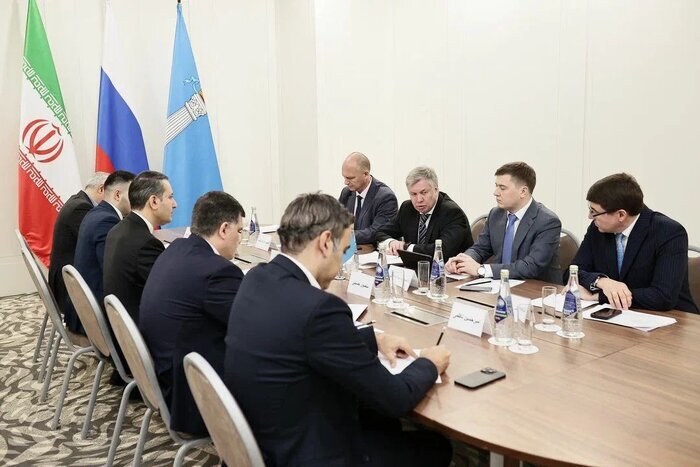Iran, Russia launch new transport projects to boost trade

TEHRAN – Iran and Russia have initiated the implementation of two major transit-logistics projects aimed at enhancing trade routes and reducing cargo transport times. The projects include the Ulyanovsk-Astara rail corridor and the Volga-Caspian Sea river route, which are expected to cut delivery times from 21 days to seven.
According to a report on Monday, the inauguration ceremony was attended by the governor of Ulyanovsk, Iran’s Consul General in Kazan, and officials from India, Azerbaijan, Turkmenistan, Iraq, as well as managers from logistics companies, including the Iranian-Russian Salyanka port. The projects aim to expand trade fleet capacity and increase economic and transit exchanges between Iran and Russia.
***Trade volume soars 76% between Iran and Ulyanovsk
Speaking at the ceremony, Ulyanovsk Governor Alexei Russkikh highlighted the importance of the Ulyanovsk-Astara rail project in facilitating faster cargo transport and reducing costs. “With the operationalization of this project, transport costs will decrease, and delivery times will be cut from 21 days to just seven,” Russkikh said.
He also noted a 76 percent increase in trade volume between Ulyanovsk and Iran during the first nine months of 2024 compared to the same period last year. Bilateral trade rose from $8.5 million in the first nine months of 2023 to $15 million in 2024, marking a new record in economic cooperation.
Strategic transit development
Ruslan Gainutdinov, advisor to the Ulyanovsk governor and project manager for the Ulyanovsk-Caspian-Astara transit corridor, emphasized that establishing secure and efficient routes for exporters is a priority under orders from the Russian president and the Ulyanovsk governor.
“This project is designed to develop trade corridors, enabling the export of goods from Russia and the regular, uninterrupted import of Iranian products through Astara and the Volga region,” Gainutdinov stated. “We are confident that, with the close cooperation of Iran’s consulate in Kazan, the Iranian embassy in Moscow, and economic institutions, this transit-logistics project will be successfully completed on schedule.”
Optimistic outlook for bilateral trade
Iran’s Consul General in Kazan, Davoud Mirzakhani, emphasized the economic significance of the Volga region, which accounts for 23 percent of Russia’s agricultural production, 20 percent of its industrial output, 20 percent of oil products, and 13.5 percent of its mineral production. “These rail and river transport projects offer promising opportunities for both nations,” Mirzakhani said.
The international corridor is considered one of the most significant joint initiatives between Iran and Russia in the Volga region, which comprises 13 provinces. Officials believe it will play a pivotal role in boosting bilateral trade and strengthening economic ties.
Ulyanovsk, a central province in Russia, lies at the intersection of the country’s east-west and north-south trade routes. With 13 ports along the Volga River, the region has a substantial role in Russia’s trade and logistics network.
EF/
